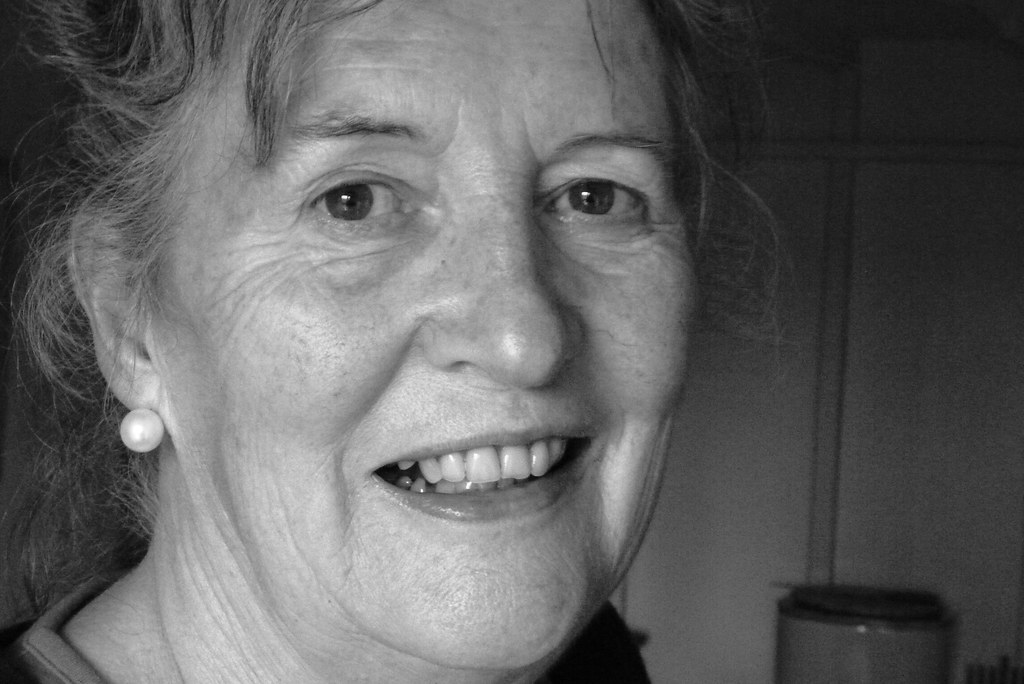Mum smiling”by Aidan-Sally is licensed under CC BY-SA 2.0
Aging comes with many challenges. Among them is maintaining good oral health. It seems that when we are young there is an emphasis on daily brushing with fluoridated toothpaste and consuming less sugar to reduce the risk of tooth decay. However, as we age, both of these decay preventive strategies seem to be put on the back burner. Why is this?
Below is an overview of the common reasons tooth decay or caries increases as we age. They include:
- Skimping on professional dental and dental hygiene care
- Dry mouth
- Dietary changes
- Decreased ability to manage optimal oral self care
- Root caries/Abfraction
Skimping on professional dental and dental hygiene care
Upon retirement, if you were lucky enough to have dental insurance prior to retiring, this benefit often gets dropped from retirement insurance coverage. Private dental insurance is available, but is notoriously pricey. As a dental hygienist in private practice, I have seem many patients who previously made regular preventive visits to the dentist, then start stretching them out and put off needed restorative care after retirement. Further, when our budgets get tight, professional dental care tends to get sidelined. It should not. Oral health is linked to general health. Maintaining a regular routine of preventive dental and dental hygiene care is as important as regular visits to the MD.
Dry mouth
Many medications have the side effect of reduced saliva or the feeling of a dry mouth, called xerostomia. Medications that commonly cause dry mouth include antihistamines, antidepressants, muscle relaxants, diuretics, and decongestants, to name a few. Other processes that can contribute to the reduced saliva flow include Sjogren’s Disease, salivary gland dysfunction, cancer treatment, normal aging, and even snoring and mouth breathing. Why is this important to know?
Saliva plays an important role in maintaining our oral health. Saliva contains many minerals that assist in digestion. It keeps the mouth moist to assist chewing and swallowing. Saliva has antibacterial qualities, helping to keep our oral tissues healthy. Minerals in the saliva are key to maintaining a neutral pH in the mouth. If the pH becomes too acidic, minerals are pulled from the tooth in order to neutralize the pH. If the saliva is too acidic for an extended period of time, mineral loss (called demineraliziation) will outpace minerals being redeposited (remineralization), leading to tooth decay. There are, however, many ways to reduce the effects of a dry mouth. Dry mouth can be difficult to treat and there is often no cure. An oral health professional can help patients learn to manage dry mouth and maintain a more neutral saliva pH.
Dietary changes
We all know what we should eat and drink to reduce the risk of tooth decay – fresh fruits and vegetables, complex carbohydrates, unsweetened beverages and limit the processed sugar. Why don’t we do that as we age? Several reasons come to mind. However, those elderly who seem to have the most cariogenic (cavity causing) diets are those who are bed or home bound, living in assisted living situations and not in control of their own diets, as well as those on limited incomes.
Those of us who have the choice and ability to choose healthy foods can still make poor choices. It is those who lack that ability who need the help of oral health care professionals to guide them to clean their teeth better and make better choices when possible.
Decreased ability to manage optimal oral self care
As we age, we need to change the way we brush and clean our teeth. The brushing technique we learned as children needs to be adapted to adult teeth and gums. Good oral self care is challenging for the healthy individual (how many of us love to floss?), and it takes time (two minutes brushing your teeth sounds like a long time). Becoming forgetful, possibly unable to stand and concentrate on our oral hygiene for 2-3 minutes, or having arthritic issues that make managing a toothbrush and dental floss difficult can create a situation where oral health begins to suffer.
Root caries/Abfraction
Tooth decay along the gumline is the most challenging to treat and prevent. Abfraction is the breaking down of the tooth at the gumline for reasons unknown. We do know that the root surface is much softer than the enamel, so the patient who grew up with generally healthy teeth can become very prone to tooth decay on the root surfaces. The best advise from oral health care professionals is to have the roots checked regularly. The RDHAP can provide preventive care and place small temporary restorations that may slow down or stop the progress of decay until the patient can see his or her dentist..
So now what?
Tooth decay can happen very fast if the issues I have described converge. A visit to the dentist or dental hygienist is important to help identify any dental or oral hygiene issues a patient is having. These professionals can help guide the patient and/or caregiver to create new routines and strategies to help protect the oral health of the patients.
If you or your loved one is elderly and challenged to get to a traditional dental office, we have a solution. The RDHAP is a private practicing dental hygienist who can come to your home and help you maintain your oral health. Go to the Map to find an RDHAP in your area.
Turner MD, Ship JA. Dry mouth and its effects on the oral health of elderly people. JADA. 2007. Accessed at https://jada.ada.org/article/S0002-8177(14)62738-0/fulltex

